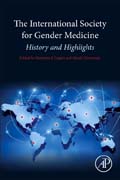
International Gender Specific Medicine highlights the history of the beginning of the women's health movement in the early 1990's, reinforced by Congressional legislation and the National Institutes of Health stipulation that females be included in clinical studies. As data accumulated, it soon became apparent that women were different from men in every system of the body and the new science of gender-specific medicine was born. The field of gender-specific medicine examines how normal human biology and physiology differ between men and women and how the diagnosis and treatment of disease differs as a function of gender. Among the areas of greatest difference are cardiovascular disease, mood disorders, the immune system, cancer, osteoporosis, diabetes, obesity, and infectious diseases. This book is essential reading for all researchers, graduate students, practitioners and anyone interested in how this diverse and thriving field developed. From the early beginning, to the recent NIH mandate that female animals be included in pre-clinical research and that research results be reported by sex, this quick read will broaden your understanding of the history of the field and highlight where the future is headed. Illustrates how major universities and organizations around the world concentrated first on the unexplored world of women's biology and then progressively adopted the larger view of the importance of investigating and comparing both sexes through all levels of biomedical researchNotes the recent NIH statement that funding would depend on inclusion of two sexes in scientific protocols wherever possible as an important affirmation of the legitimacy of gender specific scienceAddresses challenges for the future: how to incorporate both sexes in investigative protocols in a scientifically valid way, and whether or not the cost of including two sexes in protocols will be prohibitively expensiveDispels the idea that gender-specific medicine is women's medicine and how changing the name of most of the organizations currently advocating and developing gender specific medicine to include men and women (rather than just women) in their group name would help dispel this notion INDICE: Chapter 1 - Introduction - How far we have come Chapter 2 - History and Key Players Hiroaki Shimokawa, MD, PhD. , President, Japanese Society for Gender-specific Medicine Professor and Chairman, Department of Cardiovascular Medicine, Tohoku University Graduate School of Medicine Marek Glezerman, MD, Professor Emeritus, Chair of Obstetrics and Gynecology, Sackler School of Medicine, Tel Aviv University, President, The International Society for Gender Medicine, President, The Israel Society for Gender Medicine, Director, Research Center for Gender Medicine, Rabin Medical Center, Israel Alyson J. McGregor MD, MA, Director, Division of Sex and Gender in Emergency Medicine (SGEM), Co-Director, Sex and Gender in Emergency Medicine (SGEM) Fellowship, Associate Professor of Emergency Medicine Warren Alpert Medical School of Brown University Gillian Einstein, PhD, Associate Professor, Department of Psychology, Associate Professor, Dalla Lana School of Public Health, Director, Collaborative Graduate Program in Women's Health, Visiting Professor of Neuroscience and Gender Medicine, Linköping University, Sweden, Chair, Institute Advisory Board, Institute of Gender and Health, Canadian Institutes of Health Research Karin Schenck-Gustafsson MD, PhD, Professor of Cardiology, Founder and Chair, Centre for Gender Medicine, Karolinska Institutet and Karolinska University Hospital Vera Regitz-Zagrosek, Maria Grazia Modena - Italy Virginia Miller, Mayo Clinic, Principal Investigator, Specialized Center for Research of Sex Differences, Mayo Clinic, 2012-present; Research Director, Mayo Clinic's Building Interdisciplinary Research Careers in Women's Health (a National Institutes of Health-funded training program for junior faculty), 2010-present Marjorie Jenkins, MD MEHP, Professor of Medicine, Associate Dean for Women Faculty, Founder and Chief Science Officer, Laura W. Bush Institute for Women's Health, Rush Endowed Chair for Excellence in Women's Health, Texas Tech University Health Sciences Center Chapter 3 Highlights from Berlin and into the Future
- ISBN: 978-0-12-811850-4
- Editorial: Academic Press
- Encuadernacion: Rústica
- Páginas: 150
- Fecha Publicación: 01/06/2017
- Nº Volúmenes: 1
- Idioma: Inglés
